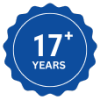Lap Band – Frequently Asked Questions
Only a doctor can suggest if it is safe for you or not. Lap band surgery is the least invasive bariatric surgery with fewer complications, less pain, less scarring, and a quicker recovery than any other form of obesity surgery.
A qualified doctor will be able to provide advice on whether gastric bypass or lap band surgery is right for you.
The national mortality rate in lap band surgery is 0.05%. This is approximately 10 times safer then the gastric bypass.
Lap Band usually has less chance of complications & does not alter the anatomy or physiology of the body.
There have been no reported cases of an allergic-type reaction to the lap band.
The size and condition of the patient’s liver prior to surgical placement of the lap band is the primary safety concern.
About two weeks before the surgery you will be on a special protein rich diet. You will have to reduce intake of foods that are high in sugar, fatty foods, fried foods & alcohol.
Medical Tourism Corporation network of hospitals have expert dieticians who guide on diet before & after the surgery.
During recovery you may feel the access port. After complete recovery & healing most people only realize they have a lap band when they eat.
The lap band is under the skin in the abdominal wall, and once the surgery incisions have healed it should not cause discomfort or limit your movements or any physical exercise.
The only sensation you may have from the port is when you go in for adjustments.
After a lap band, a small meal should make you feel full.
The lap band does not affect or hamper physical activity including aerobics, stretching, running and strenuous exercise.
It’s advised to give your body at least a year after the lap band surgery to recover on its own. After that you will be in a better position to know if you need a plastic surgery to remove any extra skin.
Normal daily routine can be restarted within 4 days after the procedure. Recovery can be a little different for everyone; some one may take less and someone may take more days to recover.
Each MTC network hospital is different. Request a quote for such details.
Lap band is safe for you to get pregnant. It does not need to be removed if you get pregnant. Still is advisable to let your doctor know if you are planning a pregnancy.
The first 3 to 4 days following gastric lap band surgery the patients must follow a clear liquid diet. Carbonated drinks are also not encouraged.
Eating small solid quantities are recommended after recovery. Since the Lap band restricts solid diet to 4 to 6 oz, nutritional value of the food you take is also important.
An expert dietician at Medical Tourism Corporation network hospital can guide you on the specifics based on individual case.
You may have to visit the doctor two to three times the first year to adjust the band.
Follow-up visits are scheduled every six months during the second and third year, depending on the individual case.
Liver sclerosis, severe heart failure, sleep apnea or any serious medical condition that stops patient from being given anesthesia could prevent patient from being considered for Lap band.
Slippage of the band (about 2%), infection and erosion of the band (very rare) are some of the possible complications. These are not life threatening complications & are easily treatable.
Look for surgeon with good experience in bariatric surgery (100 Lap band surgeries would be a good start), uses the latest technology (for example fluoroscopy) & performs the surgery in a reputed clean hospital.
Having certification from a lap band company is also helpful.
Yes, the band can be removed. Removal of the lap band usually results in stomach returning to its original shape & loosing the weight loss benefits.




